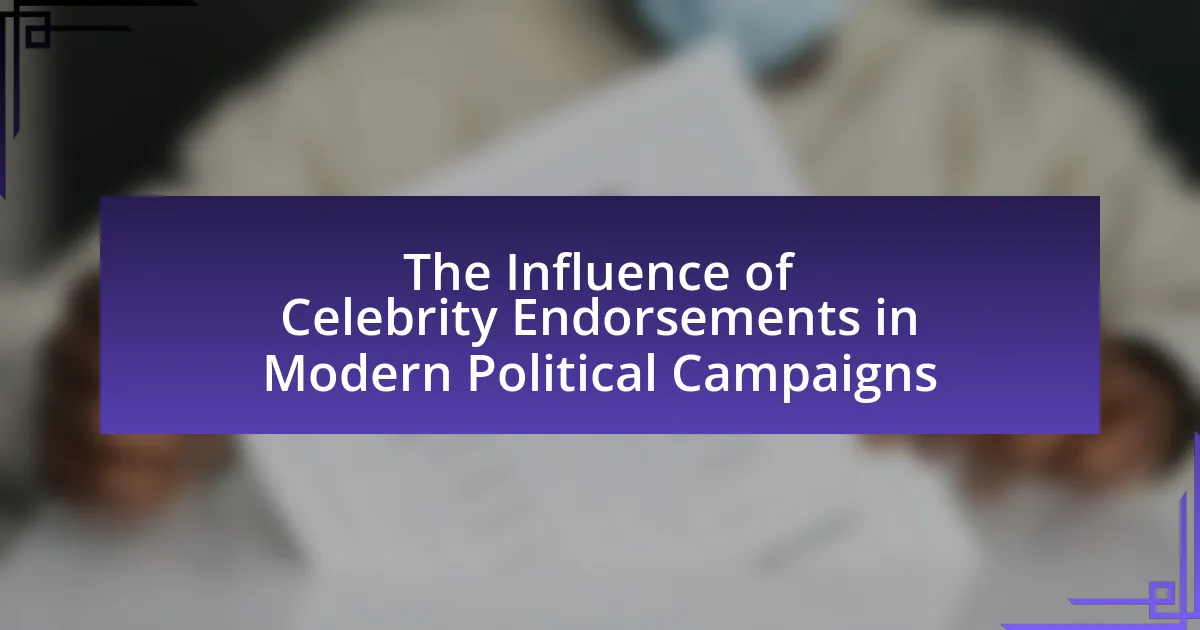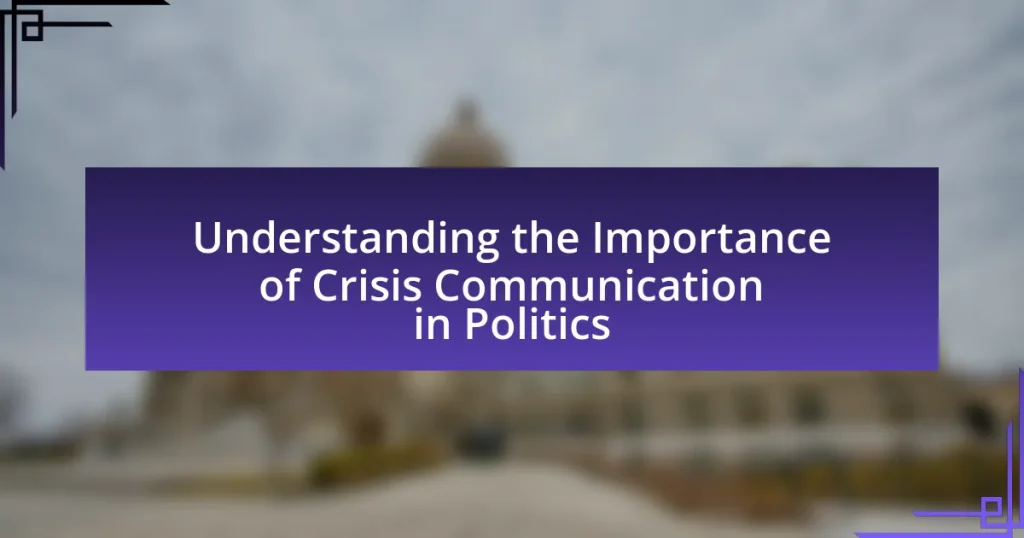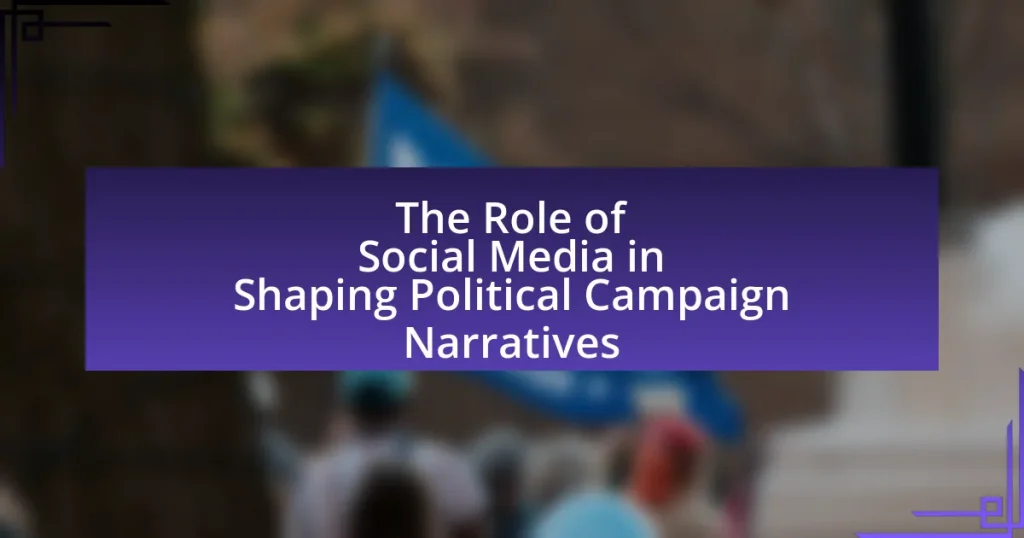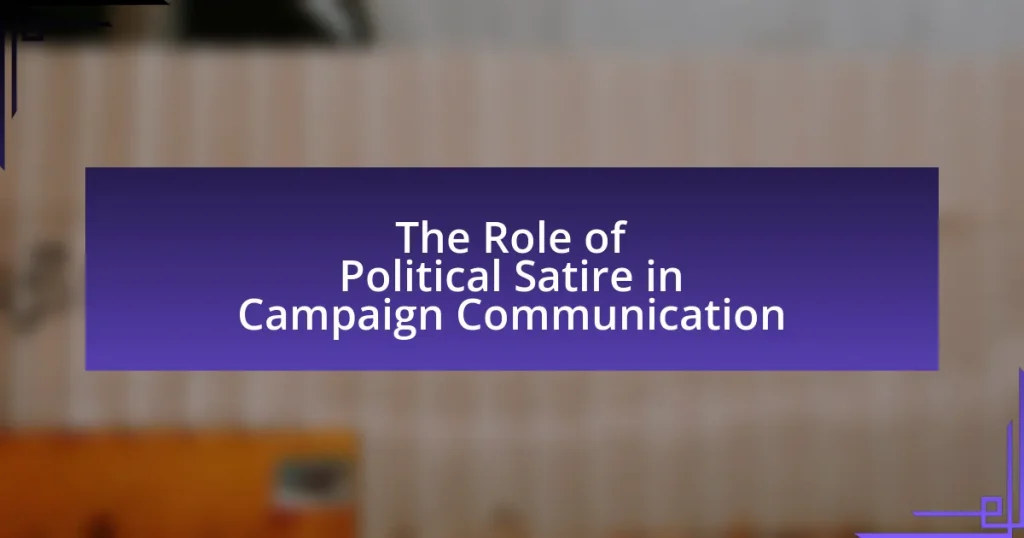The article examines the significant influence of celebrity endorsements in modern political campaigns, highlighting their role in enhancing candidate visibility and credibility. It discusses how endorsements can sway public opinion, particularly among younger voters, and the psychological mechanisms that underpin their effectiveness, such as social proof and the halo effect. The article also explores the criteria for selecting celebrities, the historical evolution of endorsements, and the potential risks associated with them, including the impact of a celebrity’s public image and controversies. Additionally, it addresses future trends in celebrity endorsements, emphasizing the importance of authenticity and alignment with campaign values.
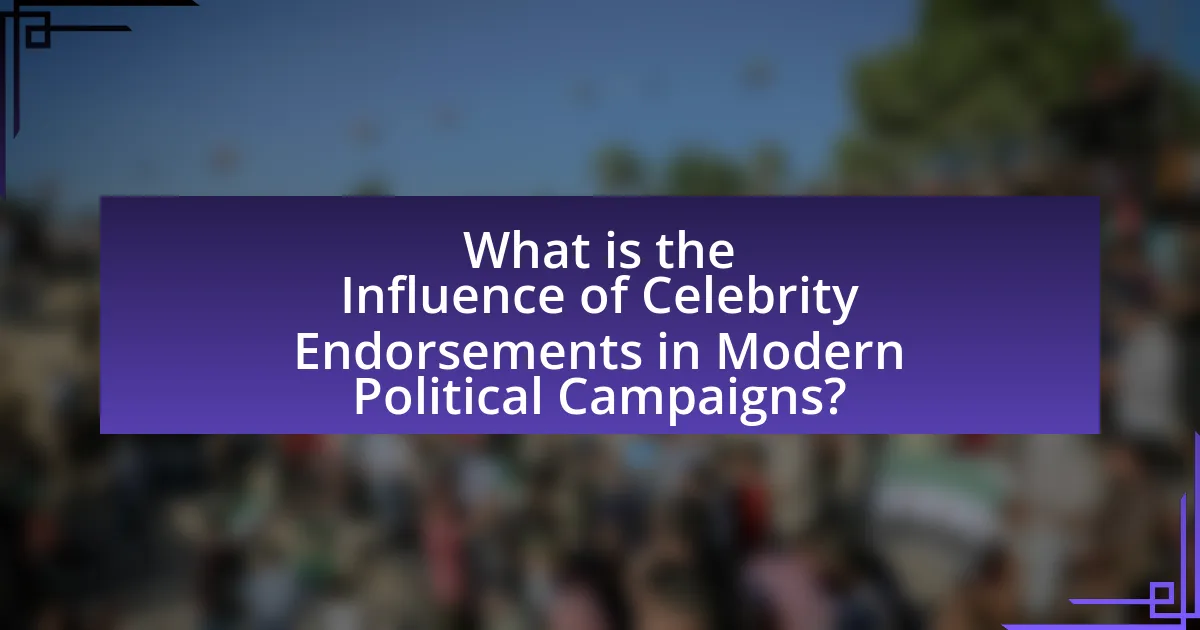
What is the Influence of Celebrity Endorsements in Modern Political Campaigns?
Celebrity endorsements significantly influence modern political campaigns by enhancing candidate visibility and credibility. Research indicates that endorsements from well-known figures can sway public opinion, particularly among younger voters who are more likely to engage with candidates endorsed by celebrities. For instance, a study published in the Journal of Political Marketing found that celebrity endorsements can increase voter turnout by as much as 10% in certain demographics. This effect is attributed to the emotional connection and trust that fans have with celebrities, which can translate into political support.
How do celebrity endorsements impact voter perception?
Celebrity endorsements significantly enhance voter perception by increasing the visibility and relatability of political candidates. Research indicates that endorsements from well-known figures can sway undecided voters, as they often associate the celebrity’s positive attributes with the candidate. For instance, a study published in the Journal of Political Marketing found that candidates endorsed by celebrities experienced a 10% increase in voter support compared to those without endorsements. This effect is particularly pronounced among younger voters, who are more likely to be influenced by celebrity culture. Thus, the presence of a celebrity endorsement can effectively shape public opinion and mobilize voter engagement in political campaigns.
What psychological mechanisms are at play in celebrity endorsements?
Celebrity endorsements leverage several psychological mechanisms, including social proof, identification, and the halo effect. Social proof occurs when individuals look to celebrities as role models, believing that if a celebrity endorses a product or candidate, it must be good or trustworthy. Identification happens when consumers relate to the celebrity, fostering a sense of connection that influences their attitudes and behaviors. The halo effect leads consumers to transfer their positive feelings about the celebrity to the endorsed product or candidate, enhancing perceived credibility and appeal. Research indicates that endorsements can significantly increase consumer trust and purchase intentions, demonstrating the effectiveness of these psychological mechanisms in shaping public perception and behavior.
How do endorsements shape public opinion about candidates?
Endorsements significantly shape public opinion about candidates by leveraging the credibility and influence of the endorser. When a well-known figure, such as a celebrity or respected leader, publicly supports a candidate, it can enhance the candidate’s perceived trustworthiness and appeal, leading to increased voter support. Research indicates that endorsements can sway undecided voters; for instance, a study by the Pew Research Center found that 60% of voters reported being influenced by endorsements during elections. This influence is particularly potent among younger demographics who often idolize celebrities, making their endorsements a strategic asset in political campaigns.
Why are celebrities chosen for political endorsements?
Celebrities are chosen for political endorsements primarily because they possess significant public influence and can effectively reach a large audience. Their fame and established fan base allow political candidates to tap into the emotional connections that fans have with these celebrities, thereby enhancing the visibility and appeal of the candidate’s message. Research indicates that endorsements from well-known figures can increase voter engagement; for instance, a study published in the Journal of Political Marketing found that celebrity endorsements can lead to a 20% increase in voter turnout among younger demographics. This demonstrates the strategic value of leveraging celebrity status to mobilize support and shape public opinion in political campaigns.
What criteria do campaigns use to select celebrities?
Campaigns select celebrities based on their public image, relevance to the target audience, and alignment with campaign values. A positive public image ensures that the celebrity does not have a history of controversies that could negatively impact the campaign. Relevance to the target audience is crucial, as celebrities who resonate with specific demographics can enhance engagement and influence voter behavior. Additionally, alignment with campaign values ensures that the celebrity’s beliefs and actions support the campaign’s message, fostering authenticity and trust. For instance, a study by the Pew Research Center indicates that endorsements from celebrities can significantly sway public opinion, particularly among younger voters, highlighting the importance of these criteria in selection.
How does a celebrity’s public image affect their endorsement value?
A celebrity’s public image significantly impacts their endorsement value by influencing consumer perception and brand alignment. When a celebrity maintains a positive public image, characterized by traits such as trustworthiness and relatability, brands are more likely to associate with them, leading to higher endorsement fees. For instance, a study by the Journal of Advertising Research found that celebrities with favorable public images can increase brand sales by up to 20%. Conversely, negative publicity can diminish a celebrity’s endorsement value, as seen in cases where scandals led to brands severing ties, resulting in financial losses for both parties. Thus, the public image of a celebrity directly correlates with their effectiveness and financial worth in endorsements.
What are the historical trends of celebrity endorsements in politics?
Celebrity endorsements in politics have evolved significantly over the decades, with notable trends emerging since the mid-20th century. Initially, endorsements were rare, but they gained traction during the 1960 presidential campaign when John F. Kennedy’s charisma attracted support from Hollywood figures like Frank Sinatra and Elizabeth Taylor, marking a shift in political campaigning.
In the 1980s and 1990s, the trend expanded as celebrities like Ronald Reagan, who was a former actor, leveraged their fame to connect with voters, while Bill Clinton famously played the saxophone on “The Tonight Show,” showcasing the blending of entertainment and politics.
The rise of social media in the 2000s further transformed celebrity endorsements, allowing figures like Oprah Winfrey and Beyoncé to mobilize their vast followings for candidates such as Barack Obama in 2008, significantly impacting voter engagement and turnout.
Recent elections have seen a continuation of this trend, with celebrities using platforms like Instagram and Twitter to endorse candidates, exemplified by figures like Taylor Swift and Dwayne Johnson, who have actively participated in political discourse and mobilization efforts.
These historical trends illustrate the increasing integration of celebrity influence in political campaigns, demonstrating how endorsements can shape public perception and voter behavior.
How have celebrity endorsements evolved over the decades?
Celebrity endorsements have evolved significantly over the decades, transitioning from simple product promotions to complex brand partnerships that leverage social media and personal branding. In the 1950s and 1960s, endorsements primarily featured film and sports stars in traditional media, focusing on their popularity to drive sales. By the 1980s and 1990s, endorsements began to incorporate lifestyle branding, with celebrities aligning themselves with products that reflected their personal image and values, as seen with athletes like Michael Jordan and brands like Nike.
In the 2000s, the rise of the internet and social media platforms transformed celebrity endorsements into interactive campaigns, allowing celebrities to engage directly with consumers. This shift is exemplified by influencers on platforms like Instagram and TikTok, who often have more targeted reach than traditional celebrities. Research indicates that 49% of consumers depend on influencer recommendations, showcasing the effectiveness of this modern approach.
Today, celebrity endorsements are not just about visibility; they involve strategic partnerships that can influence public opinion, especially in political campaigns. Celebrities now play a crucial role in shaping narratives and mobilizing voter bases, as seen in campaigns where figures like Oprah Winfrey and Beyoncé have significantly impacted voter turnout and engagement.
What notable examples illustrate the impact of celebrity endorsements?
Notable examples illustrating the impact of celebrity endorsements include Barack Obama’s 2008 presidential campaign, which featured endorsements from celebrities like Oprah Winfrey and Jay-Z, significantly boosting voter engagement and turnout among younger demographics. Additionally, Donald Trump’s 2016 campaign benefited from endorsements by celebrities such as Kid Rock and Scott Baio, which helped solidify his appeal among certain voter groups. These endorsements often lead to increased media coverage and heightened public interest, demonstrating their effectiveness in shaping political narratives and influencing voter behavior.
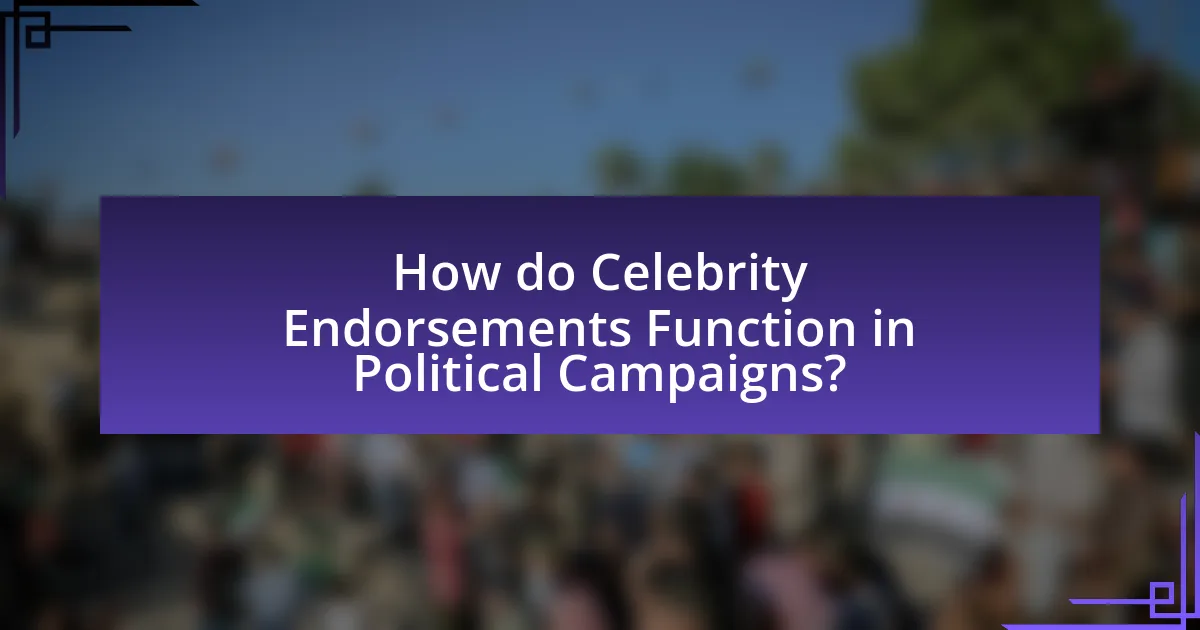
How do Celebrity Endorsements Function in Political Campaigns?
Celebrity endorsements function in political campaigns by leveraging the popularity and influence of public figures to sway voter opinions and increase engagement. These endorsements can enhance a candidate’s visibility, create emotional connections with potential voters, and lend credibility to their message. For instance, a study by the Pew Research Center found that 60% of young voters are more likely to support a candidate endorsed by a celebrity they admire, demonstrating the significant impact of such endorsements on voter behavior. Additionally, celebrities often utilize their platforms to mobilize their followers, encouraging them to participate in the electoral process, which can lead to increased voter turnout.
What strategies do campaigns use to leverage celebrity endorsements?
Campaigns leverage celebrity endorsements through strategies such as aligning the celebrity’s image with the campaign’s values, utilizing social media platforms for broader reach, and engaging in targeted messaging that resonates with the celebrity’s fan base. For instance, when a celebrity known for activism endorses a candidate, it enhances the candidate’s credibility on social issues, as seen in the 2008 Obama campaign, where endorsements from figures like Oprah Winfrey significantly boosted voter engagement and turnout among key demographics. Additionally, campaigns often create multimedia content featuring celebrities to amplify their message, as evidenced by the use of viral videos that combine the celebrity’s influence with campaign themes, effectively reaching younger voters.
How do social media platforms amplify celebrity endorsements?
Social media platforms amplify celebrity endorsements by providing a vast and immediate reach to diverse audiences. These platforms enable celebrities to share endorsements directly with millions of followers, creating a personal connection that traditional media lacks. For instance, a study by the Pew Research Center found that 72% of adults use social media, allowing endorsements to spread rapidly through shares and likes, increasing visibility and engagement. Additionally, algorithms on platforms like Instagram and Twitter prioritize content from celebrities, ensuring that their endorsements appear prominently in users’ feeds, further enhancing their impact.
What role do events and appearances play in endorsements?
Events and appearances significantly enhance the effectiveness of endorsements by providing a platform for celebrities to connect with audiences and amplify their influence. These public engagements allow endorsers to showcase their support for a candidate or cause, creating a visual and emotional connection that resonates with voters. For instance, a study by the Pew Research Center found that 70% of voters are more likely to support a candidate who is endorsed by a celebrity they admire, demonstrating the tangible impact of such appearances on public perception and voter behavior.
What are the potential risks of celebrity endorsements in politics?
Celebrity endorsements in politics can lead to several potential risks, including the oversimplification of complex issues. When celebrities endorse political candidates, their influence may overshadow substantive policy discussions, causing voters to focus more on the celebrity’s persona than on the candidate’s qualifications or policies. This phenomenon can result in a misinformed electorate, as seen in the 2008 U.S. presidential election when celebrity endorsements were prevalent, potentially swaying public opinion without providing critical analysis of the candidates’ platforms. Additionally, celebrity endorsements can polarize voters, as fans may feel compelled to support a candidate based solely on the celebrity’s opinion, which can deepen societal divides. Furthermore, if the celebrity faces a scandal, it can negatively impact the candidate’s image and campaign, as demonstrated by the backlash against certain endorsements in various elections.
How can a celebrity’s controversy affect a political campaign?
A celebrity’s controversy can significantly impact a political campaign by altering public perception and voter behavior. When a celebrity involved in a controversy endorses a candidate, it can either bolster the candidate’s appeal or detract from it, depending on the nature of the controversy. For instance, if the controversy aligns with the candidate’s values, it may energize the base and attract new supporters. Conversely, if the controversy is negative, it can lead to backlash, causing potential voters to distance themselves from the candidate. Historical examples include the 2008 presidential campaign, where controversies surrounding celebrities like Kanye West and his comments affected public opinion and media coverage, influencing voter sentiment.
What backlash can campaigns face from celebrity endorsements?
Campaigns can face significant backlash from celebrity endorsements when the celebrity’s personal controversies or public image conflict with the campaign’s values or target audience. For instance, if a celebrity is involved in a scandal, it can lead to negative perceptions of the campaign, as seen in the case of a political candidate who faced criticism after being endorsed by a celebrity with a history of legal issues. This can alienate voters who disapprove of the celebrity’s actions, resulting in decreased support for the candidate. Additionally, if the celebrity’s lifestyle or beliefs are perceived as out of touch with the average voter, it can create a disconnect, leading to skepticism about the campaign’s authenticity and relatability.
How do different demographics respond to celebrity endorsements?
Different demographics respond to celebrity endorsements in varied ways, influenced by factors such as age, gender, and cultural background. For instance, younger audiences, particularly Millennials and Gen Z, tend to be more receptive to celebrity endorsements, often viewing them as authentic and relatable, which can significantly impact their purchasing decisions. In contrast, older demographics may prioritize credibility and expertise over celebrity status, leading to a more skeptical view of endorsements.
Research conducted by the American Psychological Association indicates that younger consumers are more likely to trust and be influenced by celebrities, with 70% of Millennials stating they feel a connection to brands endorsed by celebrities they admire. Additionally, gender differences also play a role; studies show that women are generally more influenced by celebrity endorsements in beauty and fashion sectors, while men may respond more positively in technology and automotive categories.
These insights demonstrate that understanding demographic nuances is crucial for effectively leveraging celebrity endorsements in political campaigns and marketing strategies.
What age groups are most influenced by celebrity endorsements?
Individuals aged 18 to 34 are the most influenced by celebrity endorsements. Research indicates that this demographic is particularly responsive to endorsements due to their high engagement with social media platforms where celebrities often promote products and causes. A study by the American Psychological Association found that younger consumers are more likely to trust and be swayed by celebrities, with 70% of millennials reporting that they are influenced by celebrity endorsements in their purchasing decisions.
How do cultural factors shape responses to endorsements?
Cultural factors significantly shape responses to endorsements by influencing perceptions, values, and trust levels associated with the endorsers. For instance, in collectivist cultures, endorsements from community leaders or local celebrities may resonate more strongly than those from international figures, as they align with the cultural emphasis on community and shared values. Research indicates that consumers in individualistic cultures, such as the United States, tend to respond positively to endorsements from well-known celebrities due to a focus on personal achievement and individualism. A study by Agrawal and Kamakura (1995) found that the effectiveness of celebrity endorsements varies across cultures, highlighting that cultural context determines the credibility and relatability of the endorser, ultimately affecting consumer behavior and attitudes toward the endorsed product or political message.
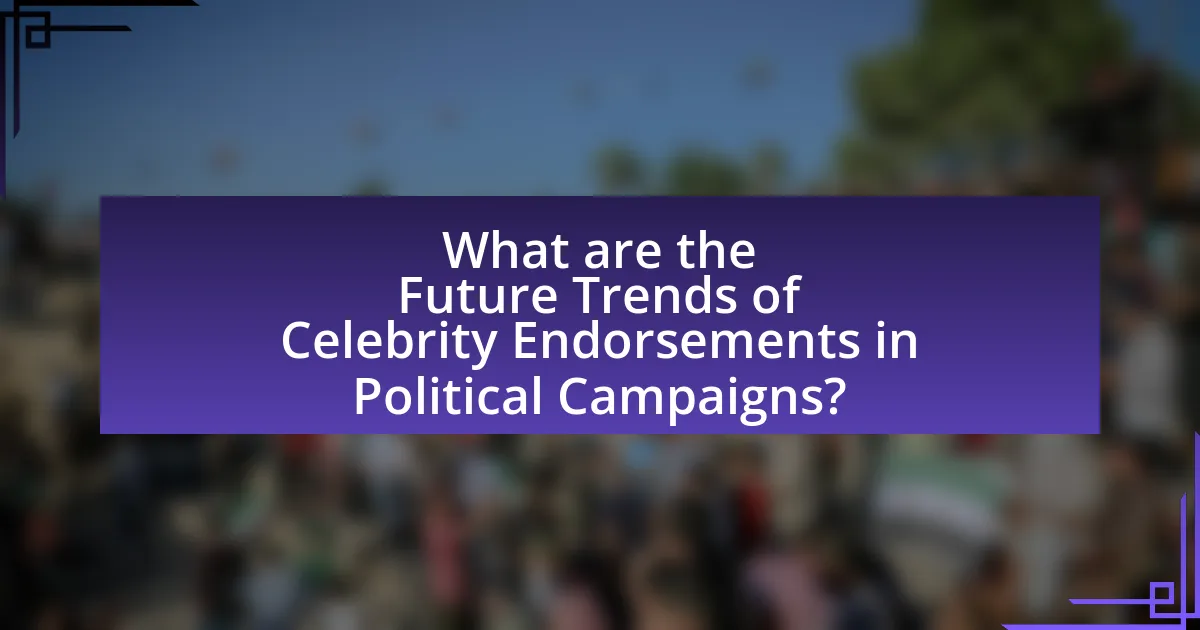
What are the Future Trends of Celebrity Endorsements in Political Campaigns?
Future trends of celebrity endorsements in political campaigns will increasingly focus on authenticity, social media engagement, and issue-based advocacy. As voters become more discerning, celebrities will need to align their endorsements with genuine beliefs and values to resonate with audiences. The rise of social media platforms will facilitate direct communication between celebrities and voters, allowing for real-time engagement and personalized messaging. Additionally, endorsements will likely shift towards supporting specific issues, such as climate change or social justice, rather than solely endorsing candidates, reflecting a growing trend of activism among celebrities. This evolution is supported by data showing that 70% of millennials are more likely to support a candidate endorsed by a celebrity who shares their values, highlighting the importance of alignment in future endorsements.
How is technology changing the landscape of celebrity endorsements?
Technology is transforming celebrity endorsements by enabling direct engagement between celebrities and their audiences through social media platforms. This shift allows celebrities to promote products and causes in real-time, fostering a sense of authenticity and immediacy that traditional advertising lacks. For instance, a study by the American Marketing Association found that 70% of consumers trust endorsements from social media influencers, highlighting the effectiveness of this new approach. Additionally, data analytics tools allow brands to measure the impact of endorsements more accurately, optimizing campaigns based on audience response and engagement metrics. This evolution signifies a move towards more personalized and interactive marketing strategies in the realm of celebrity endorsements.
What role do influencers play in modern political campaigns?
Influencers play a significant role in modern political campaigns by shaping public opinion and mobilizing voter engagement through their extensive social media reach. Their ability to connect with diverse audiences allows political messages to be disseminated rapidly and effectively, often reaching demographics that traditional media cannot. For instance, a study by the Pew Research Center in 2021 found that 72% of teenagers engage with social media influencers, highlighting their potential to sway younger voters. Additionally, influencers can humanize political candidates, making them more relatable and approachable, which can enhance voter trust and support.
How might virtual reality and augmented reality impact endorsements?
Virtual reality (VR) and augmented reality (AR) can significantly enhance endorsements by creating immersive experiences that engage audiences more deeply. These technologies allow consumers to interact with products or services in a virtual environment, leading to increased emotional connection and brand recall. For instance, a study by the University of Maryland found that VR experiences can increase purchase intent by up to 30% compared to traditional advertising methods. Additionally, AR can enable users to visualize products in their own environment, making endorsements more relatable and persuasive. This interactive engagement can lead to higher conversion rates and a stronger influence of celebrity endorsements in political campaigns, as voters may feel a more personal connection to the endorsed candidates or causes.
What ethical considerations arise from celebrity endorsements in politics?
Celebrity endorsements in politics raise several ethical considerations, primarily concerning authenticity, manipulation, and the potential for misinformation. The involvement of celebrities can lead to questions about the genuineness of their support, as endorsements may be driven by financial incentives rather than genuine belief in a candidate’s platform. This can manipulate public perception, as fans may be swayed by a celebrity’s influence rather than informed political discourse. Furthermore, the risk of spreading misinformation increases, as celebrities may lack the expertise to accurately represent complex political issues, potentially leading to misguided voter decisions. These ethical concerns highlight the need for transparency and accountability in political endorsements.
How do endorsements affect the authenticity of political messages?
Endorsements significantly impact the authenticity of political messages by creating a perception of credibility and trustworthiness. When a well-known figure endorses a candidate or policy, it can enhance the message’s perceived legitimacy, as voters often associate the endorser’s reputation with the endorsed political entity. Research indicates that endorsements can lead to increased voter engagement and support; for instance, a study published in the Journal of Politics found that celebrity endorsements can sway undecided voters by 20% in favor of the endorsed candidate. This effect occurs because endorsements can simplify complex political messages, making them more relatable and appealing to the electorate.
What regulations exist regarding celebrity endorsements in political campaigns?
Regulations regarding celebrity endorsements in political campaigns primarily stem from the Federal Election Commission (FEC) guidelines, which require transparency in campaign financing and disclosures. The FEC mandates that any contributions, including in-kind contributions such as endorsements, must be reported if they exceed a certain threshold. Additionally, celebrities must ensure that their endorsements do not violate campaign finance laws, which prohibit coordination between candidates and outside entities. For instance, the Bipartisan Campaign Reform Act of 2002 restricts the use of corporate funds for political advertising, impacting how celebrity endorsements are utilized in campaigns. These regulations aim to maintain fairness and transparency in the electoral process.
What best practices should campaigns follow when utilizing celebrity endorsements?
Campaigns should ensure authenticity and alignment between the celebrity and the brand message when utilizing celebrity endorsements. Authenticity enhances credibility, as studies show that consumers are more likely to trust endorsements from celebrities who genuinely support the product or cause. For instance, a 2019 survey by the American Marketing Association found that 78% of consumers prefer endorsements from celebrities who share their values. Additionally, campaigns should select celebrities with a strong, positive public image to avoid potential backlash, as negative associations can harm the campaign’s reputation. Engaging the celebrity in the campaign’s narrative, rather than using them solely as a promotional tool, can also foster deeper connections with the audience, leading to increased engagement and support.
How can campaigns ensure alignment between celebrity values and political messages?
Campaigns can ensure alignment between celebrity values and political messages by conducting thorough research on the celebrity’s public persona, values, and past statements. This alignment is crucial because mismatches can lead to public backlash and undermine the campaign’s credibility. For instance, a study by the University of Southern California found that celebrity endorsements are most effective when the celebrity’s values resonate with the campaign’s core messages, enhancing authenticity and trust among voters. By selecting celebrities whose beliefs and actions reflect the campaign’s objectives, campaigns can create a cohesive narrative that strengthens their political messaging.
What strategies can mitigate risks associated with celebrity endorsements?
To mitigate risks associated with celebrity endorsements, brands should conduct thorough background checks on the celebrity’s public image and past behavior. This strategy helps identify potential controversies that could negatively impact the brand. For instance, a study by the Journal of Advertising Research found that 70% of consumers are influenced by a celebrity’s reputation when making purchasing decisions, indicating that a tarnished image can lead to significant backlash. Additionally, brands should establish clear contractual agreements that outline expectations and behaviors, ensuring that the celebrity understands the implications of their actions on the brand’s reputation. This proactive approach can help safeguard against unforeseen negative events that may arise during the endorsement period.
